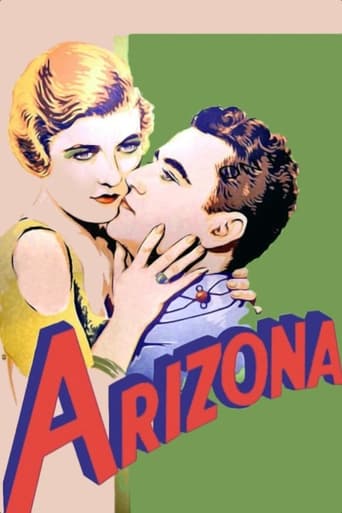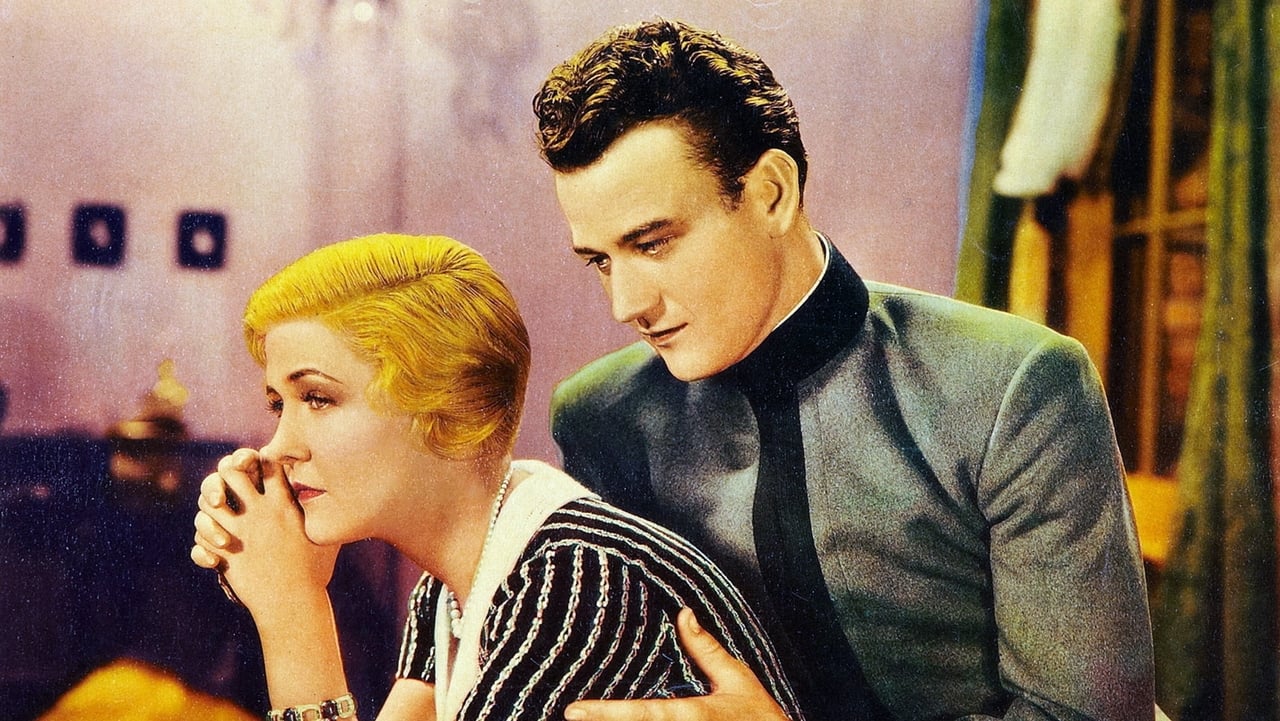MartinHafer
John Wayne is a star football player from West Point and after winning the Army-Navy football game with an extra point, he's off to serve with his mentor, the Colonel, in Arizona. However, before leaving, he gives his girlfriend (Laura La Plante) the brush off--telling her he really wasn't serious about her and would not marry anyone...ever. She was crushed and, oddly, makes the moves on the Colonel. After a short courtship, they marry and they, too, are off to Arizona.Once there, she and Wayne don't tell the Colonel about their prior relationship and Wayne begins dating the lady's younger sister (who, by the way, looks a lot like her). However, it's obvious the old girlfriend carries a grudge and doesn't like her sister hanging around Wayne. Despite earlier in the film saying he didn't want to ever marry, he does fall hard for the sister and they secretly marry.Not knowing her sister and Wayne are married, Ms. La Plante decides to hurt Wayne and get rid of him once and for all--claiming Wayne tried to sexually assault her!!! However, when she finds out that her sister is married, she tries to change her story but still weasel out of the responsibility for lying--saying she had heard from someone that Wayne was a cad so she made up the story. Finally, though, she convinces her decent husband (the Colonel) that Wayne was innocent and her earlier accusation was fabricated and everyone, apparently, lives happier ever after--though this wasn't spelled out clearly. What ALSO wasn't spelled out clearly but I think was strongly implied, by the way, was that Wayne and La Plante's earlier relationship was sexual--adding deeper understanding for why she behaved so vindictively towards him later.This was a pretty lousy film all around and aside from the fact it starred John Wayne, I probably never would have watched it. In his early career that spanned almost an entire decade, Wayne was NOT that popular or famous--appearing mostly in westerns made by studios from "poverty row". The term "poverty row" refers to the incredibly low budgets and low production values many of these tiny studios possessed. Most of these films, quite frankly, are pretty poor and just aren't worth wasting your time on unless you are a die-hard John Wayne fan. I actually do, on rare occasions, like to watch one of his "Three Mesquiteers" of "Singing Sandy" series films--they are fun and mindless and it's also fun seeing Wayne in the most ridiculous situations (such as playing a singing cowboy like Gene Autry). A few of his early films were actually NOT westerns and this is an example of a film made by a not-quite-poverty row studio (Columbia--several years before their glory years and bigger budget films).So why is it so lousy? Well, it isn't all because of the budget, though this didn't help. Much of the film was obviously made inside a sound stage and a lot of stock footage of an Army-Navy football game was recycled. However, what really sunk the film was the amateurish acting and, at times, ridiculous script. No one could act, though one of the worst offenders in this department was John Wayne himself! All the self-assuredness and swagger and energy that you have come to expect from him are gone. Instead, he just seems like a very young and inexperienced actor who could have used more coaching--which is exactly what he was. The positive is that films like this DID help to polish his acting (sort of like putting him in the minor leagues for a few years until he was ready for the big time). The negative is that the film is gosh darn awful--being very silly and sloppily made.
keesha45
Early in his career, when the Duke worked at Columbia Pictures, Harry Cohn tried him out in this romantic vehicle, for which he received second billing to Laura LaPlante, who plays a scorned Evelyn eventually getting her chance to make Bob pay for calling it quits. This mostly forgotten flick, not even listed in many film catalogs under Wayne's name, is best left that way, forgotten and unlisted. Still, as one of the first films that gave him significant billing, he holds his own against his equally forgettable cast mates. As a romantic actor, he fails to impress in his clinches with either of his lovers. It's obvious he had a long way to go to become a good actor although he never turned into a great one like the Gables and Stewarts and others then starting their careers. It's still of interest to watch the old football game and the cavalry drills in this picture, so it's not without its merits. Just don't expect much and you won't be disappointed. I'd recommend if for fans of the Duke, just to see how green he was back then. And the girls are pretty and the guys look nice in uniforms, so there are worse ways to pass an hour or so. Dale Roloff
bkoganbing
I suppose that on the plus side for John Wayne in this film he got to put on a football jersey which up until recently he had been wearing for the University of Southern California. Here he plays a cadet who kicks the winning field goal in the Army/Navy game before graduating West Point.The Duke is the foster son of Colonel Forrest Stanley and after graduation he's been assigned out in Arizona to the army post that Stanley is commandant of. Before leaving he rather callously gives the air to Laura LaPlante who he'd been seeing. Laura doesn't take the breakup well and without Wayne knowing it, makes a play for Stanley who she marries. She's out living in Arizona with Stanley and her sister June Clyde before Wayne arrives at the post.John Wayne fans should realize that this is not the Duke they're accustomed to. He's playing the kind of hero/heel part that Tyrone Power later perfected so well. It doesn't wear well on Wayne at all.In fact as I watched Arizona and did a little research on it, I saw that it was remake of a silent film of the same name that starred that greatest of swashbucklers Douglas Fairbanks. No wonder I thought that this was a film better played by someone like Tyrone Power.In the Citadel Film Series book, The Films of John Wayne, Arizona is listed under its later title of Men Are Like That. My guess is that the title was changed to not confuse viewers with the later Jean Arthur William Holden western Arizona. Of course the title need not have been changed at all, but I suspect this Arizona was re-released to take advantage of John Wayne's burst into major stardom following Stagecoach. Harry Cohn could do little else because John Wayne was pointedly not working for Columbia Pictures after Cohn fired him and later tried to blackball him in the industry. There was never any new Duke product for Columbia after Wayne became a legend.Probably only the Duke's most devoted fans would want to see Arizona.
Gary Dickerson
I suppose this is what they used to call a "woman's picture." Laura LaPlante, a fetching, if gnomish blonde, plays Evelyn Palmer, a New York girl (what she does for a living is never revealed) who's been dallying with dashing West Point cadet Bob Denton, played robotically by a very young & handsome John Wayne. When she is dumped unceremoniously before Bob's graduation, Evelyn woos & eventually marries his mentor, Colonel Bonham, played by Forrest Stanley more like a stuffed-shirt British army officer than an American who's spent years in Arizona. The big complication is that, once the newlywed Bonhams relocate to Arizona, Denton shows up for duty &, despite Evelyn's triumphant attitude toward him, Denton takes a fancy to Evelyn's sister, Bonnie, who's the cutest flapper I've seen in ages.This plot, made today, might have a bit more nastiness in that; it's as close to a "Cruel Intentions" as you're going to get in 1931. That Bob & Evelyn are having a sexual relationship is implied, of course, & it's amusing how, later in the picture, every time someone's about to say it, that person is interrupted or hushed. More than that, though I saw this on the Starz Western channel, it's more like your average sophisticated thirties melodrama than a western. The cigarettes are in boxes, gowns are worn to dinner, & the Colonel's house in Arizona is strictly Long Island.The film features some amusing stock footage of an Army-Navy football game, as well as military maneuvers. But without giving anything away, the film unwinds & then winds up in a pretty cliched manner. For John Wayne fans, it's bound to be extremely disappointing, but for those of us who are intrigued by the early days of Hollywood, good & bad, it's not such a bad way to spend an hour. But it was way too silly to be moving, & it's by the numbers mix-up plot never really generates any suspense.


 AD
AD



